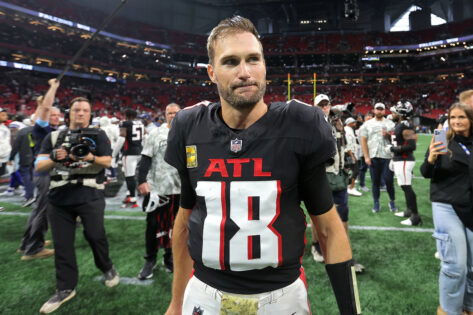The roar of the comeback was still echoing in U.S. Bank Stadium. Kirk Cousins, helmet raised, sweat plastered his hair, screaming ‘YOU LIKE THAT?!’ into the Minnesota twilight after clawing back from a 33–0 deficit. Fast forward to the muggy Atlanta summer of 2025, and that same quarterback, a $180 million Atlanta Falcons signal-caller, finds himself holding a clipboard, an earbud likely his most crucial accessory come Week One. It’s a pivot sharper than a Barry Sanders juke, leaving fans and pundits wondering: What’s next for Captain Kirk?
The question landed squarely in the lap of Hall of Famer Steve Young during a recent Rich Eisen Show segment. Rich Eisen cut to the chase: “Do you have any advice for Kirk Cousins, who is 37 and seemingly going to be a backup unless the quarterback in front of him gets hurt… Otherwise, he’s going to have an earbud in Week One for the Atlanta Falcons?” Young, whose own legacy was forged waiting in the wings behind Joe Montana before claiming his own Super Bowl glory, didn’t sugarcoat the emotional weight of the moment.
“This will sound weird with my history,” Young admitted, “but I never wanted to play backup. I’d rather do something else.” He acknowledged the lack of control players often face, a reality Cousins knows all too well after his surprise benching last season for rookie Michael Penix Jr..
Young framed the core dilemma facing Cousins, and indeed any aging athlete staring down the twilight: “At the end of your career, you have to make a fundamental decision: do you want to retire? When do you retire? When does it matter to you?” He shared his own guiding star:
“I wanted to retire a 49er. It was important to me, and that’s how I did it.” For Cousins, the path isn’t binary. Young laid out the options: “For Kirk, some guys say, ‘I’m a professional quarterback—that’s what I am—and I don’t have a starting job today, but I’m going to hang in there and be part of the mix.’ That’s perfectly okay. It’s just how you see yourself and how you want to finish it out.”
Young’s journey—waiting years behind Montana, nearly traded himself, then choosing to retire a 49er after concussions despite other offers—serves as a poignant counterpoint. He navigated his “depths of despair” with patience and discretion, a stark contrast to the public spectacle of an NBA-style trade demand. For Cousins, the path forward is murky. Does he embrace the mentor role, biding his time like Young once did?
The emotional toll, Young stressed, is profound, comparing the end of a playing career to a death that requires mourning. “Anyone who has a dream—high schoolers, college kids—they love what they do. When it ends, it’s like a death. You have to treat it like a death and mourn it. Especially for players like Kirk, whose whole life has been this—you’ll do anything not to have it end.” He acknowledged the unique prowess athletes possess: “You’re great at this; you might be good at something else, but you’ll never be as great at anything else as you are right now. Give people the grace to figure out how to end it. It’s tough.”
The NBA Cousins gambit: A high-stakes audible
Then came the provocative suggestion, a play ripped straight from the Association’s script: “He would have to speak up and say, ‘I want out,’ treat it like an NBA player demanding a trade,” Eisen stated. He immediately tempered it with realism: “I don’t know if that would work or not. It’s training camp; everybody’s already waiting for camp. That’s how it has to be for him.”
Eisen probed Young’s own history: “Did you ever say anything publicly to the media that ‘I’m stuck here—send me out of here’?” Young’s response was a masterclass in navigating quarterback politics, born from hard-won experience watching the Montana-Young saga unfold. “I was always super careful,” Young emphasized. “I recognized I was very lucky to be there because of Bill Walsh. There aren’t many great places to thrive as a quarterback.”
He recalled a pivotal moment of perspective from Steve Svy: “He grabbed me in one of my depths of despair and told me, ‘This is the greatest opportunity—mentorship from Eddie DeBartolo, Bill Walsh, Jerry Rice, Joe Montana. You’re the luckiest man alive.’ It really changed my attitude.” His advice for Cousins, forged in that fire? “You have to learn to mature your way through the dilemmas you get yourself into. The best way to give yourself a chance is not to make it a public situation.”
Credits- Jay Bendlin| Atlanta Falcons
It’s the ultimate chess move in a high-stakes game. Demanding a trade NBA-style—through backchannels with his agent, potentially escalating to ownership, or even risking fines with a public plea—carries immense risk in the tightly wound quarterback market Young described.
Cousins, holder of franchise records in both Minnesota (39 consecutive games with a TD pass) and Atlanta (509 single-game passing yards), finds his legacy at a peculiar inflection point. His four Pro Bowls and $331 million in career earnings speak to sustained excellence, yet the narrative is clouded by limited playoff success. Now, this unceremonious backup role is exacerbated by Atlanta’s massive dead-cap hit if they move him.
Does he privately seek an exit, hoping for a contender’s injury? Or does he risk the public fray, attempting to force a move in a market where starting jobs are scarcer than a perfectly thrown deep ball against Cover 2? As Young subtly warned, burning bridges publicly rarely opens new doors, especially when the league’s quarterback carousel has largely stopped spinning. Like a gunslinger in Red Dead, knowing when to walk away, Cousins’ next move requires weighing pride, practicality, and the profound grace needed to navigate an ending. The play call is in his hands.
The post HOFer’s Strong Advice For Kirk Cousins as Dejected Falcons QB Asked to Take NBA Route appeared first on EssentiallySports.
